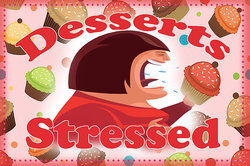
Emordnilap, what does that mean? Put simply, it describes a word that reads as another word when spelled backward. You see, emordnilap is the word palindrome spelled backward! A palindrome is a word or phrase that reads the same whether you spell it forwards or backward: "kayak," "madam," "racecar," and "refer" are some examples. And we have more palindrome examples for you to peruse.
Emordnilaps, or semordnilap if you're really into doing things backward(s), give you reversed pairs of words, not the same word. Also called levidromes, anadromes, reverse pairs, and plain backwards words, emordnilaps are a fun oddity of the English language.
What's an Emordnilap?
Emordnilaps are like palindromes' evil twins. Instead of being the same word, these rare words make a different real word when spelled backward! Reverse the word "stop" and it becomes "pots." Flip "drawer" and you get "reward." English contains a surprising variety of words that change meanings as soon as you read them from right to left.
Emordnilap Examples
Levidrome creator Levi Budd picked out what is likely the longest emordnilap to date in English: desserts and stressed. Here are 20 more reverse pairs for your lexicographical delight.
- Abut and tuba
- Ate and eta
- Avid and diva
- Bard and drab
- Bats and stab
- Brag and garb
- Decaf and faced
- Decal and laced
- Deeps and speed
- Doom and mood
- Edit and tide
- Flow and wolf
- Gnat and tang
- Maws and swam
- Redraw and warder
- Remit and timer
- Sloops and spools
- Snaps and spans
- Sports and strops
- Way and yaw
For more, check out the authoritative Levidrome List.
Is "Emordnilap" a Real Word?
Don't tell your English teacher or the spell check algorithm we said this, but...better whisper:
There's no such thing as a "real" word. If you can pronounce it and it means something that other people understand, it's real. That's what words are. The concept of a "made-up word" is silly. All words are technically made-up words.
OK. We don't think we're going to get raided by the Literal Grammar Police. That said, the various names for these reverse pairs haven't made it into big dictionaries yet. Most are of relatively recent origin: according to author O.V. Michaelsen, semordnilap was first used by linguist Dmitri Borgmann around 1961 and levidrome takes its name from its creator, a formidable young grammarian Levi Budd, who created the word when he was six after he saw a traffic stop sign and noted it spelled pots backward.
"Emordnilap," "semordnilap," and "levidrome" aren't real words in the sense of being adopted into dictionaries, but they absolutely are real words in the sense of beginning to enter common usage.
Play With Your Language
Behold the wacky word wonder that is the emordnilap. Is it important? Not really. For practical purposes, well… emordnilaps (or semordnilap, if you prefer) have no practical purposes. Neither do palindromes, for that matter. Nor do limericks, fridge poetry, cryptic crosswords or chatty dictionary articles. What those things have in common is a delight in the oddities of the English language. Emordnilaps are absolutely among those oddities.
Whether you call them reverse pairs, levidromes, anadromes or just backward words, they're a way to celebrate the unique, frankly weird patchwork that is our shared tongue. Try weaving a poem or short story around them.
For more beautiful English language weirdness, check out our funny oxymorons and malapropisms!